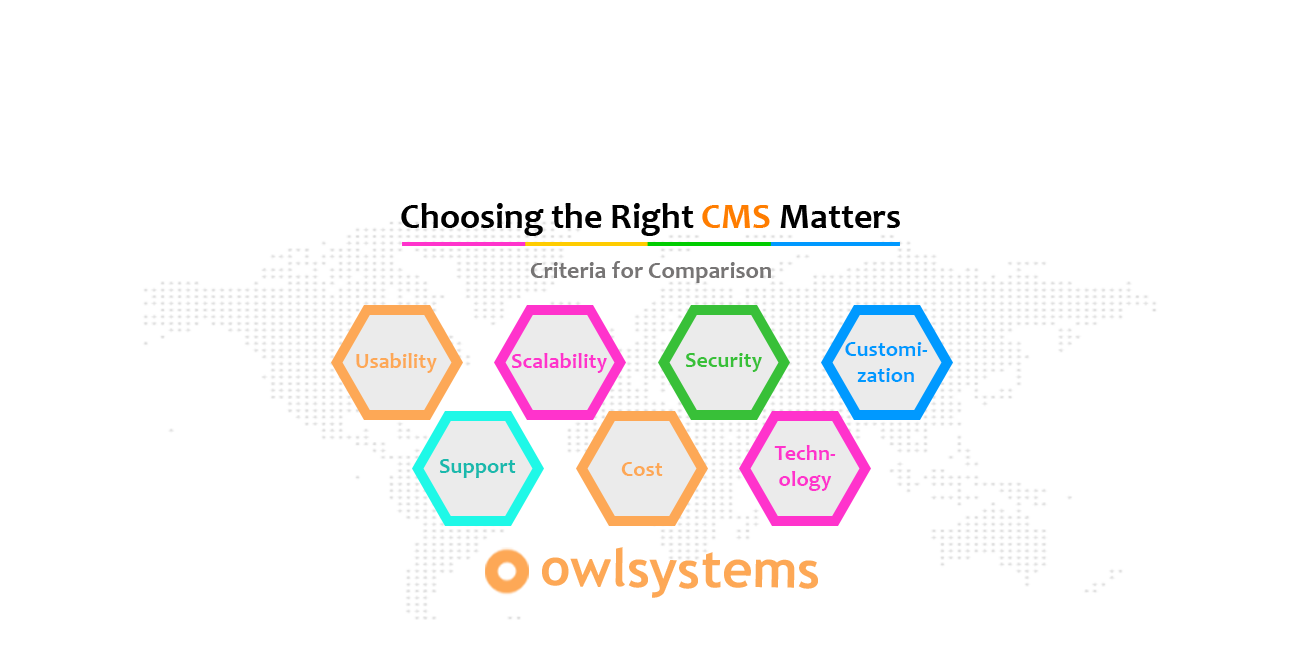In today’s digital landscape, choosing the right Content Management System (CMS) is crucial for businesses aiming to enhance their digital presence, streamline content management, and improve customer engagement. With numerous CMS platforms available, each promising unique features and benefits, making an informed decision can be overwhelming. In this article, we delve into a detailed comparison of some of the popular CMS solutions, helping you navigate through their features, performance, and ideal use cases.
Why Choosing the Right CMS Matters
An effective CMS is more than just a tool for publishing content; it is the backbone of your digital strategy, influencing everything from SEO and user experience to scalability and integration capabilities. The right CMS empowers businesses to create, manage, and deliver content seamlessly across multiple channels, enhancing customer experience and driving business growth.
Criteria for Comparison
To provide a comprehensive comparison, we evaluated each CMS based on the following criteria:
- Usability: How intuitive and user-friendly is the platform
- Scalability: Can the CMS grow with your business needs?
- Security: What security features does the CMS offer to protect your content?
- Customization: How flexible is the CMS in terms of customization and integration?
- Support and Community: What kind of support and community resources are available?
- Cost: What is the total cost of ownership, including licensing, development, and maintenance?
- Technology Stack: What technologies underpin each CMS solution?
CMS Solutions
- WordPress
- Overview: Once seen primarily as a blogging platform, WordPress has evolved into a powerful CMS with a vast ecosystem of plugins and themes.
- Technology Stack
- Core Language: PHP
- Database: MySQL/MariaDB
- Web Server: Apache/Nginx
- Front-end: HTML, CSS, JavaScript
- Strengths:
- Highly customizable with thousands of plugins and themes.
- Strong community support and extensive documentation.
- Cost-effective, especially for small to medium-sized enterprises.
- Weakness
- Can become cumbersome with too many plugins, affecting performance.
- Security requires constant monitoring and updates.
- Drupal
- Overview: Known for its robustness and scalability, Drupal is a favorite for large, complex websites and applications.
- Technology Stack:
- Core Language: PHP
- Database: MySQL/MariaDB, PostgreSQL, SQLite
- Web Server: Apache/Nginx
- Front-end: HTML, CSS, JavaScript
- Strengths:
- Highly flexible and customizable with a strong focus on scalability.
- Excellent for complex content structures and large-scale websites.
- Strong security features and a dedicated developer community.
- Weaknesses:
- Steeper learning curve compared to other CMS platforms.
- Development and maintenance can be more time-consuming and costly.
- Sitecore
- Overview: Sitecore is a leading enterprise CMS known for its powerful personalization and marketing automation capabilities.
- Technology Stack:
- Core Language: C#
- Database: Microsoft SQL Server
- Web Server: IIS
- Front-end: HTML, CSS, JavaScript
- Strengths:
- Advanced personalization and marketing automation features.
- Robust integration capabilities with various marketing tools and CRM systems.
- Strong support and professional services.
- Weaknesses:
- High cost, making it suitable primarily for large enterprises.
- Requires significant technical expertise for setup and maintenance.
- Adobe Experience Manager (AEM)
- Overview: AEM is a comprehensive CMS offering robust features for content management, digital asset management, and personalized customer experiences.
- Technology Stack:
- Core Language: Java
- Database: Various (e.g., MongoDB, TarMK)
- Web Server: Apache
- Front-end: HTML, CSS, JavaScript (ExtJS, CoralUI)
- Strengths:
- Integrated with Adobe’s suite of marketing tools, enhancing digital marketing capabilities.
- Strong content management and digital asset management features.
- Scalable and suitable for large enterprises with complex needs.
- Weaknesses:
- High cost and resource-intensive implementation.
- Requires specialized skills and training to manage effectively.
- Contentful
- Overview: As a headless CMS, Contentful offers flexibility and scalability, making it ideal for modern web and mobile applications.
- Technology Stack:
- Core Language: JavaScript/Node.js
- Database: Various (NoSQL databases like MongoDB)
- Web Server: Various (cloud-based)
- Front-end: Any front-end framework (React, Angular, Vue.js)
- Strengths:
- API-first approach, enabling seamless integration with various front-end technologies.
- Scalable and flexible, suitable for microservices architecture.
- Strong developer community and extensive API documentation.
- Weaknesses:
- Requires more development effort compared to traditional CMS platforms.
- May lack some out-of-the-box features found in monolithic CMS solutions.
Use Case Scenarios
- Small to Medium-Sized Enterprises: For businesses with limited budgets and simpler content needs, WordPress offers a balance of functionality and cost-effectiveness.
- Large Enterprises with Complex Needs: Drupal and Sitecore are ideal for organizations requiring high customization, scalability, and robust security features.
- Modern Web Applications: Contentful’s headless CMS is perfect for businesses looking to build flexible, API-driven applications with a focus on performance and scalability.
Conclusion
Selecting the right CMS is a strategic decision that can significantly impact your digital strategy and business growth. Whether you prioritize ease of use, scalability, security, or advanced features, there’s a CMS solution tailored to meet your needs. At OWLSystems Solutions, we specialize in helping businesses navigate these choices, providing expert guidance and tailored solutions to ensure you leverage the full potential of your CMS.
Ready to Elevate Your Digital Strategy?
Contact us today for a consultation or demo, and let’s explore how we can transform your digital presence with the right CMS solution.
